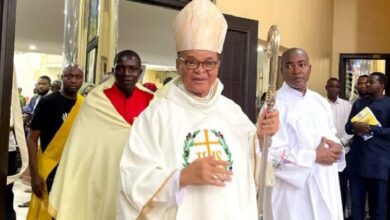Put your faith before nationality – Cardinal Turkson
Source: CNA
His Eminence Peter Cardinal Turkson, Prefect for the Dicastery of Integral Human Development at the Vatican, has warned that when Catholics focus on national or regional identities first “and make that qualify Catholicism or Catholic teaching, there was a might good chance that they may be going in parallel lines and never meet.
He challenged Catholics around the world to respond with openness and a willingness to confront global issues in a truly Catholic manner.
At a meeting with Reporters at Georgetown University, Washington DC, the Cardinal warned that Catholics from various regions of the world might lose sight of what was more important when placing these identities at the forefront, rather than the faith.
“The thing that binds us, that makes us common is the fact of belonging to the Catholic faith,” he stressed.
Cardinal Turkson was joined by Archbishop Silvano Maria Tomasi, former Permanent Observer of the Holy See to the United Nations, in the May 31 Meeting.
They spoke with Reporters about a range of challenges facing the Church and the West today, including climate change, migration, education, development and social cohesion.
The two Prelates came to the University as part of a National Convention of Catholic University Centres studying Catholic Social Teaching.
Archbishop Tomasi, who also has experience working with refugee and migration issues, warned that recent trends in the West promote what he called a “self-centered” and inward-focused politics that can distract these nations from helping to find solutions to global problems.
“If you look around the world, one of the situations we see in Europe, for example, even in Africa; there is a tendency in a part of the population to close in on itself.”
“It is a global issue and if you limit yourself to the needs of your own country,” Archbishop Tomasi said, “you are not going to solve the problem.”
To truly create solutions to social problems, however, the Church believes that care must be taken for the good of the human person, Cardinal Turkson said. “Development,” he stressed, “is ultimately about the human person.”
“The human person requires certain conditions to flourish. Some of these are moral conditions while others are physical,” he continued. “Human ecology from the point of view of the Church would require…legislation, policies that enable a human person to flourish and realize its dignity.”
Development efforts that fail to recognize both the bodily and spiritual needs of persons, the Cardinal warned, are “kind of flawed – it is not quite complete.”
Similarly, efforts that promote “norms which negatively affect human growth and development,” Cardinal Turkson told CNA, pose the risk of “ideological colonization” and the pushing of harmful ideas as contingencies for development to happen in the first place.
Despite the risks of shortcomings, and collaboration in facing global struggles was a necessity – and a reason why Cardinal Turkson was disappointed to hear the United States would be re-evaluating its relationship with the Paris Climate Agreement. Cardinal Turkson played a major role in helping to broker the 2015 Paris Climate Agreement.
“The truth is that climate is a global public good and not limited to any country, not limited to any nation,” he said, advocating for the acceptance of “global responsibility” for the health of the environment.
Yet, while these issues are global, response to them – both in policy and in politics – have local sources to first consult. Cardinal Turkson granted that it was understandable for a leader to reconsider the deal’s economic burdens or the weight of participation in the agreement on a given nation’s citizens.
He cautioned, though, that complete abandonment should not be done without consulting other nations that are party to the Agreement and also those threatened by climate change.
When looking towards the future, another issue the United States, Europe and other countries have to consider is the question of migration, Archbishop Tomasi stated. Pointing to special initiatives by the Holy See on migration and refugees, calling for a global response and innovative solutions to the questions of migration.
“The fact that the Pope wants to show a special interest in migration is to emphasize the fact that that migration is not a European problem, it is a global problem,” he said. “It touches the Americas, it touches Australia, it touches Asia, and in this sense, he wants to emphasize the need for governments to address this issue in a global way.”
An integrated, complete response to migration will require more than just readjustment of quotas or physical resettlement of migrants, the Archbishop said, but considering how immigrants and refugees already fit into receiving societies.
“It is in the self-interest of the United States, as it is in the self-interest of Europe, to look at immigration in a more constructive and positive way, and look at integration, rather than just debate how many we can take in.” He pointed to many industries in Western nations that rely upon immigrant labour or support.
Yet, he granted, there were serious challenges to consider, such as the integration of new immigrants into existing communities. These issues, he challenged “are very fundamental issues.”
Still, Archbishop Tomasi said in all of these issues, Catholics who live in the United States can have a global impact. “The presence of the Catholic community in the United States plays a role in influencing the government or creating public culture.”
“It has an impact outside the United States,” Archbishop Tomasi said. “In that sense, given the political pre-eminence of our country, if the Catholic community succeeded in promoting certain aspects of life and culture that are acceptable in the American context, they would have an impact outside.”
